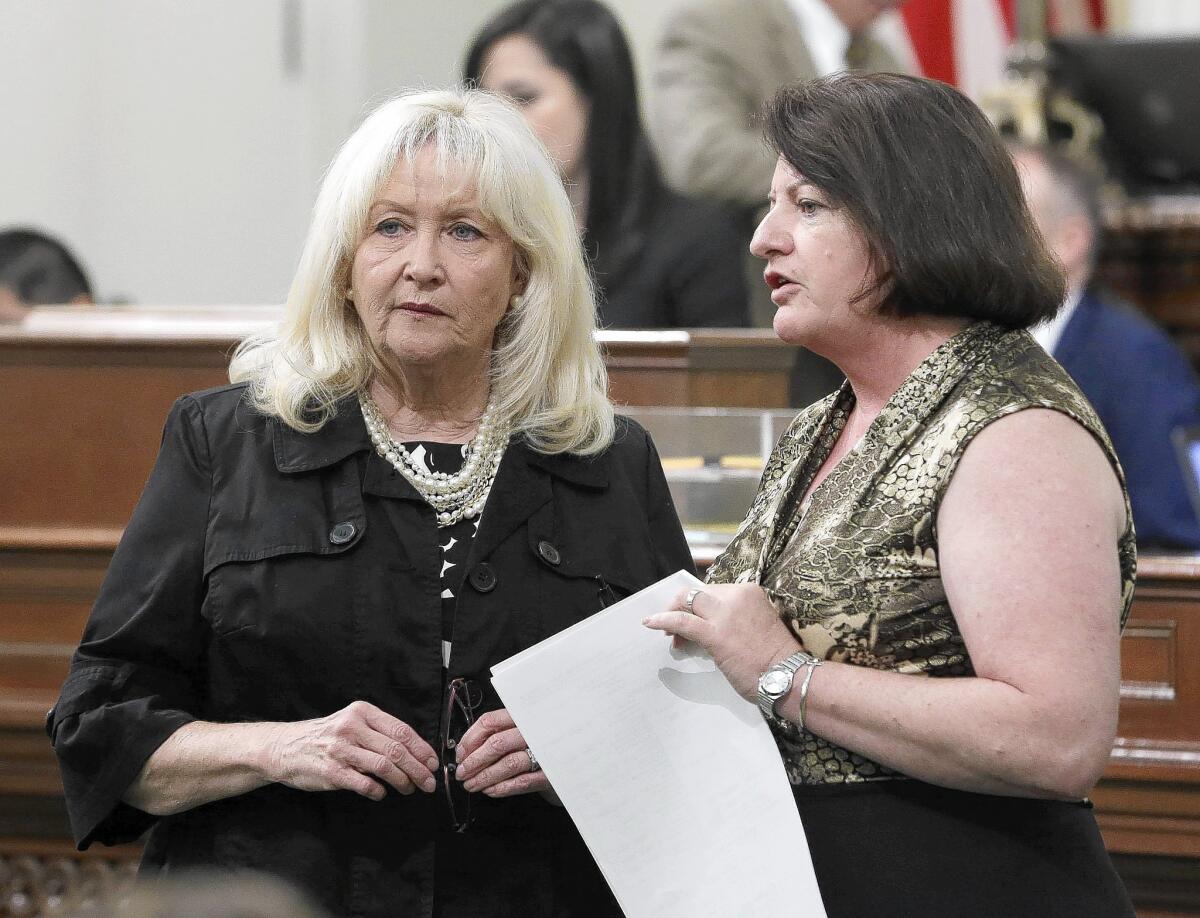California lawmakers have a busy month ahead

- Share via
Reporting from SACRAMENTO — It’s crunch time at the state Capitol.
Lawmakers return from summer recess Monday with less than a month left to act on key issues such as gun control measures introduced after the massacre in Isla Vista last spring and ethics measures proposed after three state senators were charged with crimes.
The two-year legislative session will end Aug. 31, and lawmakers will be making their last-gasp attempts to win approval of more than 1,000 pending bills, many of them controversial. In addition to addressing guns and official corruption, they will consider legalizing Internet poker, regulating medical marijuana and scaling back an unpopular $11-billion water bond scheduled for the November ballot.
“This is the time when things come together, when we rally support and finalize agreements, and when we orchestrate the compromises that resolve tough problems,” said Assembly Speaker Toni Atkins (D-San Diego).
“August may be the dog days of summer,” she said, “but in the Legislature, it’s Iditarod time.”
Activity typically rises to a frenzy now, as special interests try to get last-minute bills introduced, lobbyists put on a full-court press for their agendas and legislators work into the night trying to line up votes.
“It’s crazy time,” said Sen. Hannah-Beth Jackson (D-Santa Barbara).
In this election year, votes on divisive legislation take on special significance as lawmakers try not to alienate voters. In particular, Democrats are trying to regain the supermajority they held in the Senate before the suspension of the three members caught up in separate criminal cases.
Sen. Roderick Wright is awaiting sentencing Sept. 3 after a jury found him guilty of eight felonies, including voter fraud and perjury, for lying about living in his Inglewood-area district. Sens. Leland Yee and Ronald S. Calderon face federal corruption charges that include accepting bribes for official actions in FBI sting operations.
The Assembly has a Democratic supermajority. But the lack of one in the Senate threatens pending legislation that requires a two-thirds vote in both houses, including a proposal to replace the $11-billion water bond with one that is smaller and possibly more likely to be approved by voters.
The scandals in the Senate have spawned more than a dozen bills to be decided in the next four weeks. They include proposals to bar officials and political candidates from paying family members with campaign funds, require state candidates to report their campaign finances every three months rather than twice a year, as now required, and ban lobbyists from holding political fundraisers in their homes.
One bill would lower the limit on gifts to state officials from $440 to $200, bar gifts from lobbyists and prohibit lawmakers from accepting free tickets to professional concerts and sporting events as well as amusement parks, spas and golf.
It passed the Senate unanimously and needs a two-thirds vote in the Assembly. Members in that house have not been touched by scandal, and some good-government advocates say lawmakers there may not feel the same pressure to tighten rules of conduct on themselves.
Kathay Feng, executive director of California Common Cause, noted that some ethics bills were watered down and others scuttled, but she said lawmakers still have an opportunity to pass significant changes.
“We are hopeful that evidence of at least three state lawmakers engaged in illegal behavior would spur the Legislature to pass real ethics reform bills with the teeth to enforce the laws,” Feng said.
A spate of bills addressing gun violence was introduced after 22-year-old Elliot Rodger went on a rampage in Isla Vista in May, killing six UC Santa Barbara students and injuring 13 other people.
One proposal would create a new kind of restraining order that would allow family members and mental health professionals who believe an individual is dangerous to get the court to take away the individual’s ability to possess firearms.
Another would provide grants to police departments so they could deploy more officers to identify gun owners whose weapons should be confiscated. A lack of resources has led to a large backlog of people who possess guns even though they are disqualified because of criminal convictions or significant mental health problems.
“This is to prevent tragedies … in the future,” Jackson said.
Other legislation on the table would:
- Regulate and require state permits for medical marijuana dispensaries.
- Phase out single-use plastic bags from grocery store checkout lines.
- Require actors in pornographic films to wear condoms while working.
- Allow Californians to play Internet poker on state-sanctioned websites.
- Place a measure before voters to repeal the state ban on bilingual education.
This August, state senators will have one fewer distraction than usual:
In response to the recent ethics scandals, the upper house recently adopted a rule against soliciting or accepting political contributions from any special interest that hires a lobbyist during the final month of the session.
[email protected]
Twitter: @mcgreevy99
More to Read
Sign up for Essential California
The most important California stories and recommendations in your inbox every morning.
You may occasionally receive promotional content from the Los Angeles Times.











